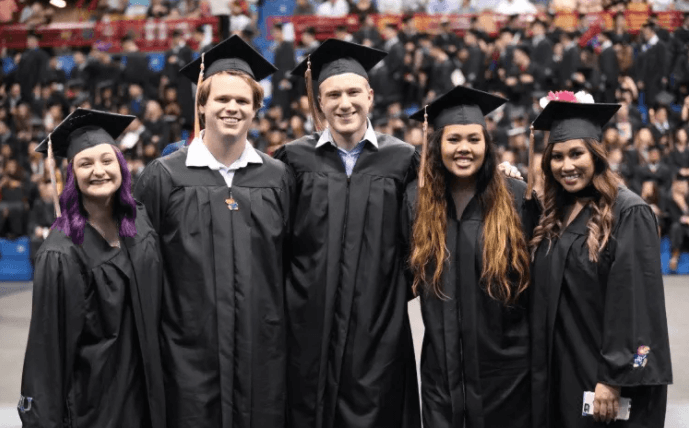A worrying surge of anti-Asian hate and racism in the United States has forced US business schools to take action.
US schools are especially reliant on applications from candidates from Asian countries, China in particular, with thousands of Chinese professionals applying to MBA and business masters programs in the US each year.
In a statement, the Graduate Management Admission Council (GMAC), which represents business schools, said:
We are greatly saddened and disturbed to know that people of Asian heritage are reporting experiencing acts of discrimination and violence. The uptick in crimes, racist acts and bullying against individuals of Asian heritage, Asian Americans and Pacific Islanders cannot stand.
We are committed to creating opportunities for more students to pursue their dreams of attaining an MBA or business master’s degree—and to do so in a safe and welcoming environment.
US business schools vs Anti-Asian Hate
While applications to US business schools increased amid the COVID-19 pandemic—from both domestic and international candidates—the pandemic has also contributed to an increase of anti-Asian hate crimes in the US.
Since the coronavirus outbreak in China, Asians in the US, and elsewhere, have reported increasing anti-Asian sentiments. The Atlanta spa shootings, in March 2021, brought the issue to the fore, with six of the eight casualties Asian women.
US business schools are understandably eager to present themselves as a welcoming environment for Asian candidates.
Dean Matthew Slaughter, of Dartmouth’s Tuck School of Business, denounced the rise in racist and xenophobic rhetoric and acts in a letter to the school community, urging students impacted by recent events to reach out to the school’s support teams. Students at Tuck can also seek immediate assistance via the LiveSafe app, a Dartmouth-specific safety smartphone app.
NYU Stern has urged students who witness acts of racism or bias to report them to NYU’s Bias Response Line, while NYU Stern’s Asian Business Society (ABS) is inviting the Stern community to a virtual gathering to discuss recent events.
The University of Pennsylvania formed a Task Force on Support to Asian and Asian American Students and Scholars following the COVID-19 outbreak, which hosts a regular dialogue series supporting Asian Wharton students.
The Office of Community Engagement and Inclusion at Duke University’s Fuqua School of Business has held Restorative Circles on Anti-Asian/Asian American hate and xenophobia and students held a socially-distanced vigil. Fuqua is also planning an event called a Daring Dialogue in which speakers will share their personal stories about Anti-Asian discrimination.
“We feel these types of interactions are important to not only help those experiencing discrimination to process and hopefully begin to heal, but to also give the rest of our community a chance to understand and learn from others’ experiences,” say Stephanie Robertson, assistant dean of community engagement and inclusion and Rick Larrick, associate dean of diversity, equity and inclusion at Fuqua.

Elsewhere, Xibei (Carol) Zhang, president of Asian Business Club at UNC Kenan-Flagler Business School (pictured), shared a list of resources providing mental health support for Asian students following the Atlanta shootings. The UNC Kenan-Flagler wellness teams have also created virtual drop-in spaces for students seeking support.
Carol, from Harbin in China, says experiencing racism has been especially challenging for Asian students, many of whom come from more homogenous societies.
“Most of us did not anticipate the kind of verbal and physical violent attacks that have been occurring over the last year and many of us are worried about our own safety and personal security,” she says.
On top of dealing with impact of COVID-19 on daily life, Asian students feel added pressures and anxiety, Carol notes. “We feel stressed about finding ourselves in the wrong place at the wrong time simply by going to a supermarket or shopping mall.”
Mark W. Nelson, Anne and Elmer Lindseth dean and professor of accounting at Cornell University’s Samuel Curtis Johnson Graduate School of Management, says it’s important students check in with their Asian classmates. “To the Johnson Asian, Asian American and Pacific Islander (AAPI) community, we are here for you if you need anything,” he says.
Students have been invited to attend virtual events on the topic of anti-Asian hate, and the Asia Business Association posted a Call-To-Action Plan for the Johnson community.
Read: 8 Of The Cheapest MBA Programs In The USA
©Kansas FB
Impact on Asian business school candidates
While the rise of anti-Asian hate in the US is extremely troubling for many students, Asian business school candidates are still drawn to US business schools, according to leading MBA admissions consultants.
Although Barbara Coward admits some Asian candidates may be discouraged from applying, she says she hasn’t seen any candidates withdrawing applications due to anti-Asian racism. “There is such a strong desire to get an MBA from a prestigious university in the United States that it seems outweighs any anxiety,” she says.
Pascal Michels, of Menlo Coaching, says Asian clients continue to view top US schools as inclusive and welcoming environments, while Scott Edinburgh, of Personal MBA Coach, notes how Asian and Asian American students continue to be one of the largest minority groups on many MBA campuses.
11% of students in the Harvard Business School MBA class of 2022 came from Asia (second only to the US) and 24% of the US students from Wharton's class of 2022 identified as Asian American.
Carol says Asian candidates should not let the rise of anti-Asian racism put them off studying in the US. “I know I must be vigilant about my safety, but the chance to study in the US remains a remarkable opportunity,” she says.
Next Read:




